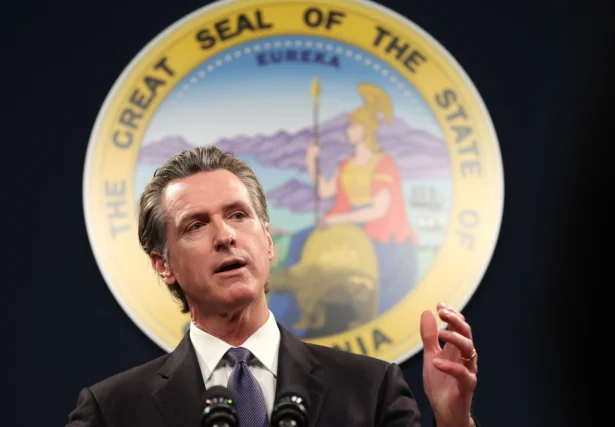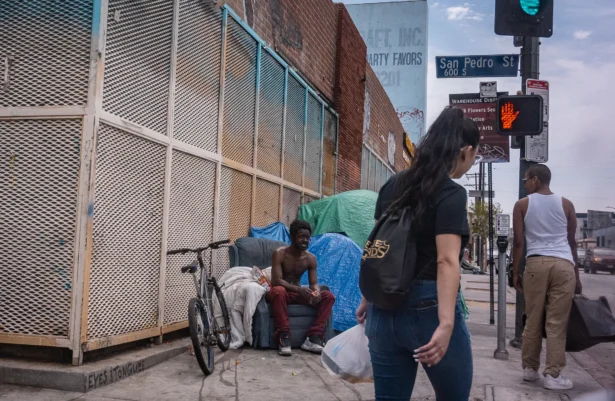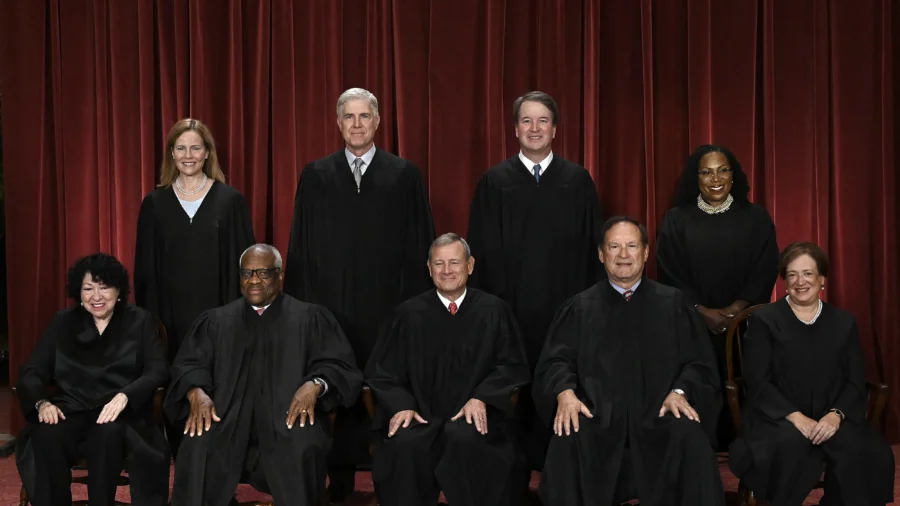Gov. Gavin Newsom’s office asked the U.S. Supreme Court to review a ruling that has prevented cities from clearing out homeless encampments.
The Democratic governor’s office, in a brief filed (pdf) on Sept. 22, warned that a ruling that scrapped anti-camping ordinances in Grants Pass, a city located in Oregon near the border with California, has prevented cities around the Golden State from clearing out homeless people from parks, sidewalks, and other public areas.
“While I agree with the basic principle that a city shouldn’t criminalize homeless individuals for sleeping outside when they have nowhere else to go within that city’s boundaries, courts continue to reach well beyond that narrow limit to block any number of reasonable efforts to protect homeless individuals and the broader public from the harms of uncontrolled encampments,” Mr. Newsom said in a statement as he filed the court papers with the high court to review the City of Grants Pass v. Johnson case.
Courts, he argued, should make a ruling to halt what he called “confusing” and “impractical” rulings that can only worsen the homelessness crisis. “Courts have tied the hands of state and local governments that seek to use common sense approaches to clean our streets and provide help for unhoused Californians living in inhumane conditions,” his statement continued.
The U.S. Court of Appeals for the Ninth Circuit in August upheld a ruling that blocked an anti-camping rule in Grants Pass that would have blocked people from sleeping on public property. That ruling had expanded on the 2018 Martin v. City of Boise case, which blocked the criminalization of preventing people from sleeping in public areas if cities cannot supply beds for them.

In the case, three homeless people filed a class action lawsuit against the city of Grants Pass and challenged the legality of the city’s enforcement policy of their public camping ordinance. Their lawyers claimed that the ordinance violated the U.S. Constitution’s Eighth Amendment, which prevents excessive bail and fines, or cruel or unusual punishment.
The 9th Circuit’s ruling, meanwhile, was handed down as West Coast cities like Los Angeles, San Francisco, and Portland have grappled with a significant rise in homelessness, encampments, and public drug usage in recent years. Mr. Newsom, the former mayor of San Francisco before he was elected governor, argued that the myriad of recent court rulings lack clarity and prevent cities from engaging in public safety measures.
“These courts have stretched Martin’s reasonable limit into an unsurmountable roadblock, preventing cities and towns from imposing commonsense time and place restrictions to keep streets safe and to move those experiencing homelessness into shelter,” Mr. Newsom’s brief stated. “California’s elected officials who seek in good faith to improve what often appears to be an intractable crisis have found themselves without options, forced to abandon efforts to make the spaces occupied by unhoused people safer.”
In December, U.S. District Court Chief Magistrate Judge Donna Ryu issued an injunction that prevented San Francisco from continuing efforts to clear out tent camps, prompting the city to appeal to the Ninth Circuit earlier this year.
In Los Angeles, a district court recently ruled that shelters have to meet a long list of requirements, including rules for nursing staff, testing mandates for diseases, and mandates for on-site security before the city could enforce anti-camping laws, according to Mr. Newsom’s filing.

The California State Association of Counties and League of California Cities also filed an amicus brief, telling the justices last week that previous federal court rulings have imperiled cities from sweeping homeless camps and order people off the streets due to public safety concerns.
“The State of California and its cities and counties are engaged in unprecedented efforts to address homelessness through the creation of significant new policy initiatives and funding investments,” the league and association wrote in their filing to the Supreme Court (pdf). “However, camping ordinances can be a useful tool in appropriate circumstances in addressing the complex conditions that exist in our homeless populations.”
For years, Mr. Newsom has targeted federal judges who have blocked sweeps of homeless camps, saying that they undercut efforts to move such individuals out of dangerous areas. He told Politico earlier this month that he wanted his case to go to the U.S. Supreme Court.
“I hope this goes to the Supreme Court, and that’s a hell of a statement for a progressive Democrat,” Mr. Newsom told the outlet. “It’s gone too far. People’s lives are at risk.”
Lawyers for the Grants Pass plaintiffs have not issued public comments after the California governor’s office filed its brief last week.
The case is Grants Pass v. Johnson; No. 23-175.
From The Epoch Times


